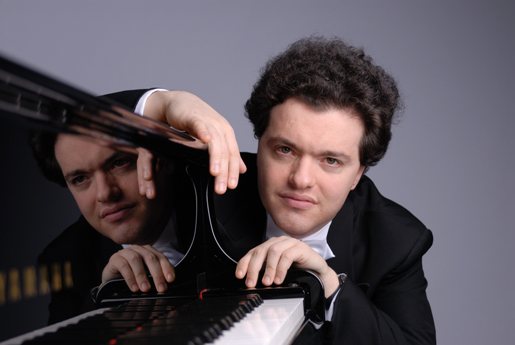No surprises but plenty of fire and artistry in Kissin’s exhilarating Liszt

Given the daunting physical demands of Franz Liszt’s piano music, one might assume that these works form a conspicuous segment of the repertoire of Evgeny Kissin, the celebrated Russian pianist whose considerable assets seem tailor-made for music Berlioz said was playable only by the composer himself.
In fact, while Liszt has been a staple of Kissin’s concerts and recordings from his earliest years, the actual Liszt works in Kissin’s programs are fairly circumscribed. No doubt this is part of a larger pattern—his repertoire remains surprisingly slim even as the former prodigy enters middle age and a third decade of concertizing.
Many music lovers (including this one) adore Liszt’s Sonata in B minor, yet harbor reservations about most of the hundreds of other works penned by history’s most famous virtuoso. Kissin may not have entirely eased these misgivings, but Sunday afternoon at Symphony Center he presented yet another exhilarating display of supreme keyboard artistry.
First up was a bewitching account of Ricordanza, the ninth entry in the composer’s Herculean Transcendental Etudes. Many pianists find theatrical gold in the webs of filigree and flights of melodrama, but Kissin rightly read it as a tableau of memory and nostalgia, spinning melodies with a minimum of fuss, giving them a chance to be absorbed amidst the prolonged cadenzas.
The Sonata was the program’s centerpiece, and local pianophiles were no doubt eager to hear how Kissin might measure up to their favorite interpretations. Judging by the ecstatic audience reaction, few were disappointed by an account that was both personal and true to the pianist’s history, yet not so idiosyncratic as to disturb cherished memories or contradict the written score.
Most passages were on the brisk side, but rarely self-consciously so. Dynamic contours were carefully gauged to give sharp relief to the craggy and complex formal contours, while the famous and treacherous fugue unfolded with bracing clarity. Only in the final explosive outburst did the tempo seem oddly hurried, yet he survived this tortuous minefield unscathed. Most impressively, his concentration never flagged during the entire massive single movement, even when a blaring cell phone erupted during one of most delicate passages.
Funérailles (from Harmonies poétiques et religieuses) opened at a surprisingly temperate volume in the lowest register, the pianist clearly intending the shifting modalities to emerge from the din. There was an affecting and grave solemnity to the voicing and pace, and the heroic climaxes were a moving reflection of the composer’s homage to the 1849 Hungarian uprising.
Two works from the musical travelogue Années de pèlerinage were as authoritative in execution as the rest of program, though by this time the composer’s reliance on pyrotechnics was beginning to wear. Even the pianist’s clear eye couldn’t sweep away the cobwebs from the saccharin Vallèe d’Obermann. The watery roulades of Gondoliera from Venezia e Napoli seemed to defy the limits of human dexterity, and the program-closing Tarantella was simply the most astonishing display of keyboard wizardry I’ve ever encountered.
Kissin rewarded the audience with three encores (Liszt, naturally), more than audiences usually demand but far less than the eight or nine he dispatched in the same hall a few years back. The arrangement of Schumann’s Widmung was by turns delicately lyrical and devilishly florid. My favorite was a richly hued Liebestraum, a rare instance of the composer relying on his innate melodic gifts to carry much of the heavy lifting.
The recital might have held even more intrigue had the pianist explored the vast Lisztian repertoire for possible hidden gems. But Kissin is no sleuth, preferring to let posterity make most of his decisions. It’s tough to argue with a formula that has paid off so handsomely.
Posted in Uncategorized

